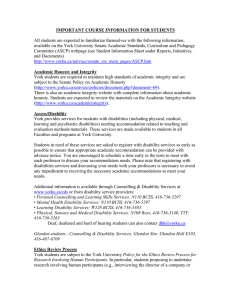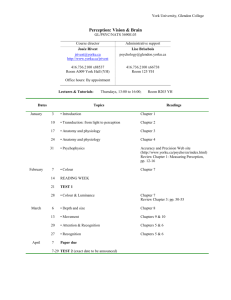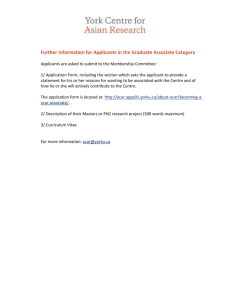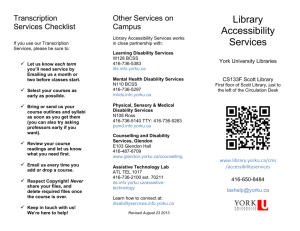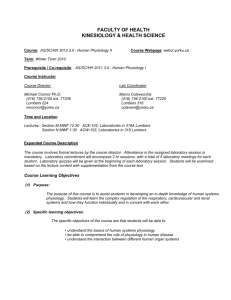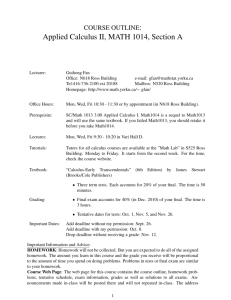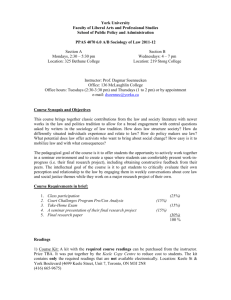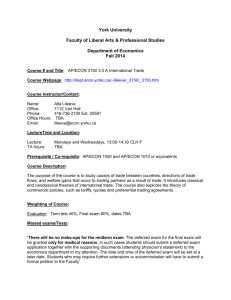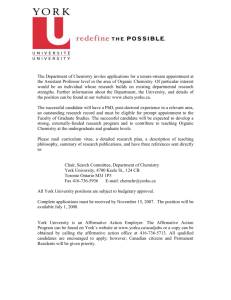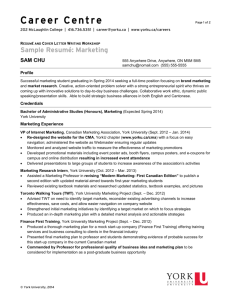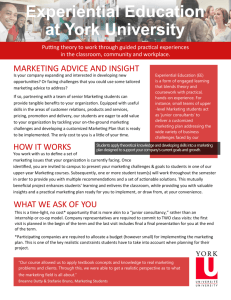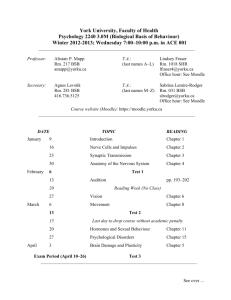official york outline here
advertisement
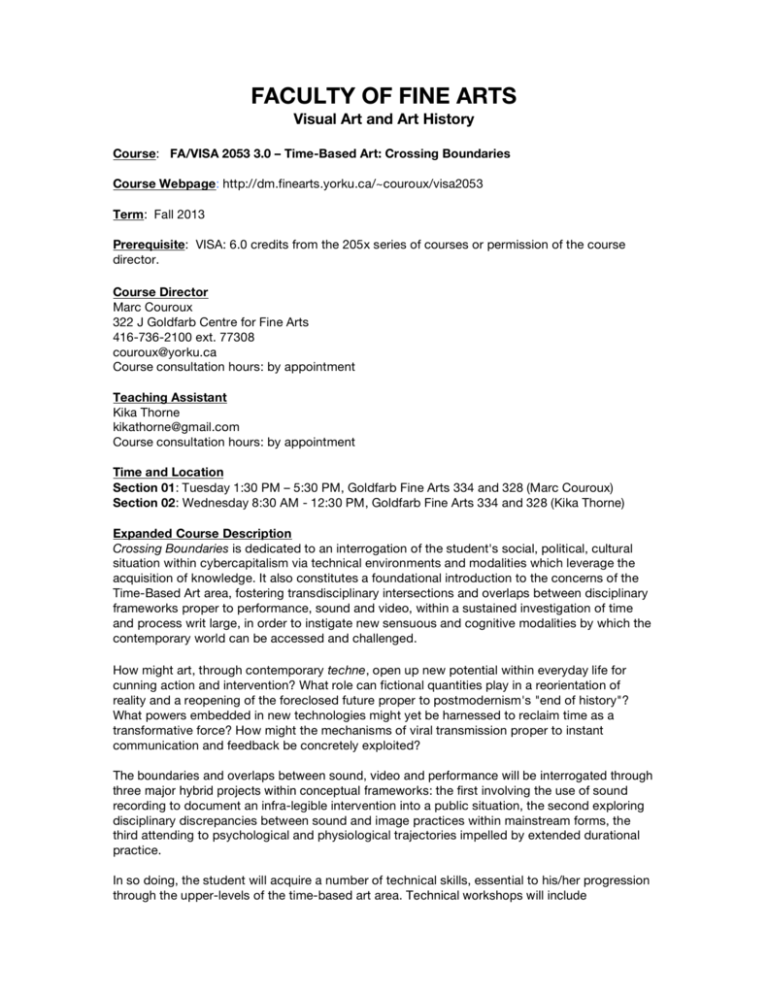
FACULTY OF FINE ARTS Visual Art and Art History Course: FA/VISA 2053 3.0 – Time-Based Art: Crossing Boundaries Course Webpage: http://dm.finearts.yorku.ca/~couroux/visa2053 Term: Fall 2013 Prerequisite: VISA: 6.0 credits from the 205x series of courses or permission of the course director. Course Director Marc Couroux 322 J Goldfarb Centre for Fine Arts 416-736-2100 ext. 77308 couroux@yorku.ca Course consultation hours: by appointment Teaching Assistant Kika Thorne kikathorne@gmail.com Course consultation hours: by appointment Time and Location Section 01: Tuesday 1:30 PM – 5:30 PM, Goldfarb Fine Arts 334 and 328 (Marc Couroux) Section 02: Wednesday 8:30 AM - 12:30 PM, Goldfarb Fine Arts 334 and 328 (Kika Thorne) Expanded Course Description Crossing Boundaries is dedicated to an interrogation of the student's social, political, cultural situation within cybercapitalism via technical environments and modalities which leverage the acquisition of knowledge. It also constitutes a foundational introduction to the concerns of the Time-Based Art area, fostering transdisciplinary intersections and overlaps between disciplinary frameworks proper to performance, sound and video, within a sustained investigation of time and process writ large, in order to instigate new sensuous and cognitive modalities by which the contemporary world can be accessed and challenged. How might art, through contemporary techne, open up new potential within everyday life for cunning action and intervention? What role can fictional quantities play in a reorientation of reality and a reopening of the foreclosed future proper to postmodernism's "end of history"? What powers embedded in new technologies might yet be harnessed to reclaim time as a transformative force? How might the mechanisms of viral transmission proper to instant communication and feedback be concretely exploited? The boundaries and overlaps between sound, video and performance will be interrogated through three major hybrid projects within conceptual frameworks: the first involving the use of sound recording to document an infra-legible intervention into a public situation, the second exploring disciplinary discrepancies between sound and image practices within mainstream forms, the third attending to psychological and physiological trajectories impelled by extended durational practice. In so doing, the student will acquire a number of technical skills, essential to his/her progression through the upper-levels of the time-based art area. Technical workshops will include introductions to sound (Audacity) and video editing (Premiere), compression for online circulation and basic audio recorder and microphone use. The course will consist in weekly lectures focused on the presentation of artwork and ideas germane to the course, paired with lab time geared towards working out technical and conceptual aspects of the student’s projects. In-process work will be periodically discussed in an environment of open exchange, in which alternate / future creative, conceptual or technical ramifications will be elaborated upon. Assignments In addition to small weekly exercises to be completed by the student for each class, there will be three major project assignments (of equal weight). In addition to this, students will be periodically required to present their work-in-progress for class discussion. Blog Personal research and development constitutes an essential component of studio production. Students will be required to explicitly attend to their progression through the conceptual and technical materials of the course by developing an online blog, including (but not limited to): interrogation of central concepts; responses to assigned readings; drafting of ideas with conceptual implications, timeline and technical requirements; goals and strategy and notes on production. This blog can be in any format (Wordpress, Blogger, Tumblr etc.) but should be representative of an accumulation of ideas and practical information over the duration of the course of study. Course Learning Objectives 1. Purpose Crossing Boundaries is dedicated to an interrogation of the student's social, political, cultural situation within cybercapitalism via technical environments and modalities which leverage the acquisition of knowledge. It also constitutes a foundational introduction to the concerns of the Time-Based Art area, fostering intersections and overlaps between disciplinary frameworks proper to performance, sound and video, in order to instigate new sensuous and cognitive modalities by which the contemporary world can be accessed and challenged. Each class will begin with a 60-minute presentation on ideas relevant to the course of study. In addition to this, readings and viewing excerpts (available online) will be assigned each week, subject to in-class discussion. In-class tutorials for audio and video software (Audacity, Premiere) will take place periodically. Reviews of material covered in class will be made available on an online, editable wiki. Following in-class tutorials, the remainder of the class will be devoted to discussion, open studio / lab time for assignments and project support. 2. Specific objectives At the end of this course, the student will be able to: - create hybrid, transdisciplinary works using digital technologies, while probing the nature of disciplinary boundaries; draw on a rich diversity of theory and practice exploring the individual's cognitive and perceptual situation in late capitalism; assess the fertile proliferation of audio-visual technologies in their capacities to leverage real-world situations; draw on a plethora of conceptions of the nature of temporal experience and the potentials for intervention these enable; develop critical skills within a critique-based format which will enable him/her to assess the work of his/her peers and offer suggestions as to alternate / future creative or - technical ramifications; engage in a critical discussion of ideas in an online blog. Course Text / Readings Online readings will be assigned during the course and will be subject to in-class discussion. Evaluation In addition to three major studio projects, each student will be required to maintain an online blog (see above). The final grade for the course will be based on the following items weighted as indicated: Project #1: Project #2: Project #3: Blog: Participation + presence: 25% (infra-legible intervention, documentation) 25% (appropriation: sound & image reorientation) 25% (extended durational performance) 15% 10% The Senate Grading Scheme and Feedback Policy stipulates that (a) the grading scheme (i.e. kinds and weights of assignments, essays, exams, etc.) be announced, and be available in writing, within the first two weeks of class, and that, (b) under normal circumstances, graded feedback worth at least 15% of the final grade for Fall, Winter or Summer Term, and 30% for ‘full year’ courses offered in the Fall/Winter Term be received by students in all courses prior to the final withdrawal date from a course without receiving a grade. See the policy for exceptions to this aspect of the policy: http://www.yorku.ca/secretariat/policies/document.php?document=86 Term Term Term F Y W Last date to drop courses Nov. 8 without receiving a grade Feb. March 14 7 Grading, Assignment Submission, Lateness Penalties and Missed Tests Grading: The grading scheme for the course conforms to the 9-point grading system used in undergraduate programs at York (e.g., A+ = 9, A = 8, B+ - 7, C+ = 5, etc.). Assignments and tests will bear either a letter grade designation or a corresponding number grade (e.g. A+ = 90 to 100, A = 80 to 90, B+ = 75 to 79, etc.) (For a full description of York grading system see the York University Undergraduate Calendar: http://www.registrar.yorku.ca/calendars/2011-2012/academic/grades/ Students may take a limited number of courses for degree credit on an ungraded (pass/fail) basis. For full information on this option see Alternative Grading Option in the Faculty of Fine Arts section of the Undergraduate Calendar: http://www.registrar.yorku.ca/calendars/2011-2012/faculty_rules/FA/grading.htm Assignment Submission: Proper academic performance depends on students doing their work not only well, but on time. Accordingly, assignments for this course must be received on the due date specified for the assignment. Lateness Penalty: Assignments received later than the due date will be penalized (one halfletter grade for each additional day after the due date). Exceptions to the lateness penalty for valid reasons such as illness, compassionate grounds, etc., may be entertained by the Course Instructor but will require supporting documentation (e.g., a doctor’s letter). IMPORTANT COURSE INFORMATION FOR STUDENTS Academic Honesty and Integrity York students are required to maintain high standards of academic integrity and are subject to the Senate Policy on Academic Honesty (http://www.yorku.ca/univsec/policies/document.php?document=69). There is also an academic integrity website with complete information about academic honesty. Students are expected to review the materials on the Academic Integrity website (http://www.yorku.ca/academicintegrity). Access/Disability York provides services for students with disabilities (including physical, medical, learning and psychiatric disabilities) needing accommodation related to teaching and evaluation methods/materials. These services are made available to students in all Faculties and programs at York University. Students in need of these services are asked to register with disability services as early as possible to ensure that appropriate academic accommodation can be provided with advance notice. You are encouraged to schedule a time early in the term to meet with each professor to discuss your accommodation needs. Please note that registering with disabilities services and discussing your needs with your professors is necessary to avoid any impediment to receiving the necessary academic accommodations to meet your needs. Additional information is available through Counselling & Disability Services at www.yorku.ca/cds or from disability service providers: • Personal Counselling and Learning Skills Services: N110 BCSS, 416-736-5297 • Mental Health Disability Services: N110 BCSS, 416-736-5297 • Learning Disability Services: W128 BCSS, 416-736-5383 • Physical, Sensory and Medical Disability Services: N108 Ross, 416-736-5140, TTY: 416-7365263 Deaf, deafened and hard-of-hearing students may also contact dhh@yorku.ca Glendon students - Counselling & Disability Services, Glendon Site: Glendon Hall E103, 416-4876709 Ethics Review Process York students are subject to the York University Policy for the Ethics Review Process for Research Involving Human Participants. In particular, students proposing to undertake research involving human participants (e.g., interviewing the director of a company or government agency, having students complete a questionnaire, etc.) are required to submit an Application for Ethical Approval of Research Involving Human Participants at least one month before you plan to begin the research. If you are in doubt as to whether this requirement applies to you, contact your Course Director immediately. Religious Observance Accommodation York University is committed to respecting the religious beliefs and practices of all members of the community, and making accommodations for observances of special significance to adherents. Should any of the dates specified in this syllabus for an in-class test or examination pose such a conflict for you, contact the Course Director within the first three weeks of class. Similarly, should an assignment to be completed in a lab, practicum placement, workshop, etc., scheduled later in the term pose such a conflict, contact the Course director immediately. Please note that to arrange an alternative date or time for an examination scheduled in the formal examination periods (December and April/May), students must complete an Examination Accommodation Form, which can be obtained from Student Client Services, Student Services Centre or online at http://www.registrar.yorku.ca/pdf/exam_accommodation.pdf (PDF) Student Conduct Students and instructors are expected to maintain a professional relationship characterized by courtesy and mutual respect and to refrain from actions disruptive to such a relationship. Moreover, it is the responsibility of the instructor to maintain an appropriate academic atmosphere in the classroom, and the responsibility of the student to cooperate in that endeavour. Further, the instructor is the best person to decide, in the first instance, whether such an atmosphere is present in the class. A statement of the policy and procedures involving disruptive and/or harassing behaviour by students in academic situations is available on the York website http://www.yorku.ca/univsec/policies/document.php?document=82 Please note that this information is subject to periodic update. For the most current information, please go to the ASCP webpage (see Student Information Sheet under Reports, Initiatives, and Documents) http://www.yorku.ca/univsec/senate_cte_main_pages/ASCP.htm
